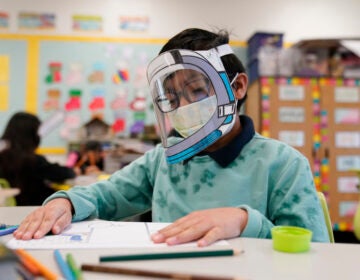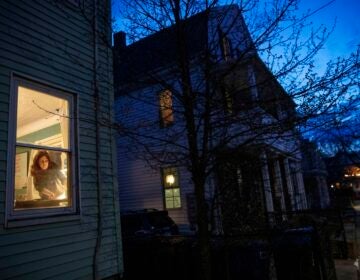I’m trying to sign up for the COVID vaccine, but I’m not good with computers. Help!
Online sign-up forms are frustrating many people, especially older ones now eligible for vaccines. WHYY’s Health Desk Help Desk spoke to a few of you.
Listen 7:57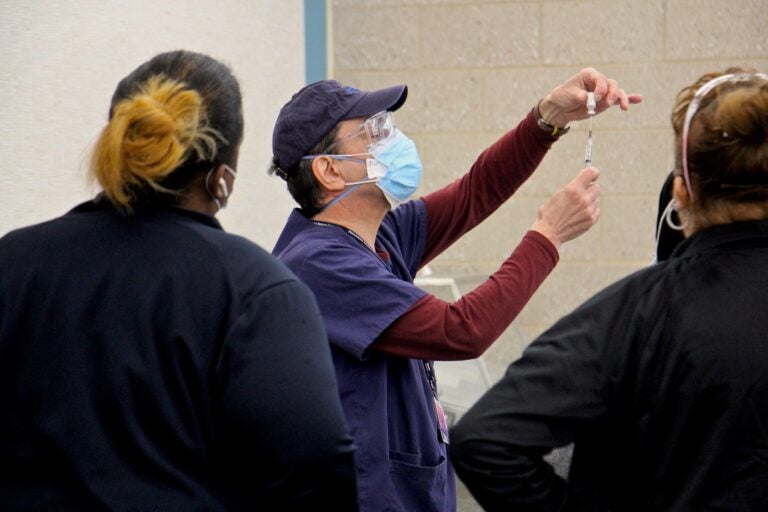
A staff member demonstrates how to prepare a dose at Philadelphia's COVID-19 vaccine center at Martin Luther King Jr. Older Adult Center on Cecil B. Moore Avenue. (Emma Lee/WHYY)
This is one of a series of articles in which reporters from WHYY’s Health Desk Help Desk answer questions about vaccines and COVID-19 submitted by you, our audience.
If you’re eligible for the COVID vaccine but still haven’t been able to get an appointment, you’re in good company. For those without reliable internet access, or who simply don’t have tech know-how, navigating the vaccine rollout can be overwhelming.
This week, the Health Desk Help Desk spoke to people struggling to get vaccine appointments … and to people who are working to solve that problem, one dose at a time.
A listener, Victoria, is 81 and lives in Montgomery County. She says she knows she’s eligible for the vaccine, but she hasn’t been able to sign up — even though she’s been trying for months. She doesn’t have a computer at home, so she has to go to the library to try to register. Are other people having this problem?
We’ve been hearing a lot from seniors like Victoria who are having a hard time signing up. But this particular call had to do with one very specific barrier: technology.
Most vaccine sites across the country require people to register and schedule their appointments online. But for people with limited tech skills, or who don’t have computers or cellphones or internet access, a variety of obstacles spring up — from not knowing which priority group they’re in, to not knowing where to sign up locally, to not being able to sign up fast enough to get an open slot.
That problem of access is called the digital divide, and it disproportionately affects low-income people, people living in rural areas, people of color, and older adults, which means some of the groups at the highest risk for severe symptoms of COVID-19 are having trouble getting their shots.
Is this a widespread issue? How many elderly people have been vaccinated in our area so far?
Not many of the people who have been vaccinated so far are 65 or older, even though Pennsylvania, Delaware, and New Jersey all list that group as one of their current priorities. Of the three states, Delaware is the only one where more than half the people who have been vaccinated are age 65 or older. Philadelphia is vaccinating people age 75 or older, but less than 15% of the people vaccinated so far are in this age group. We also know that residents of color in underserved neighborhoods have seen much lower rates of vaccination than white and wealthier ones, further underlining the access gap.
High-risk groups are eligible for the vaccine. But eligibility doesn’t guarantee access.
What makes it so difficult?
Bill Johnston-Walsh, state director of AARP in Pennsylvania, said there are 1.8 million older AARP members in the state (the minimum age to join is 50). When surveyed, he said, thousands of them mentioned being confused, frustrated, and upset about the sign-up process, calling it “the Wild West,” a “crapshoot,” and a “degrading Hunger Games.”
“We have found that the 65-plus, they’re on their computers, but they’re there for two things — they’re there to FaceTime their grandchildren or they’re there to play games, not really having to navigate other parts of the Internet,” Johnston-Walsh said. “So what we’re finding out is that we really need to go a little more low-tech.”
For seniors who aren’t tech-savvy, online registration is hard, Johnston-Walsh said: All the appointments could be gone in the time it takes them to fill out the online form. They could call, of course, but there’s no centralized state or regional call system, and not all vaccine clinics have phone-scheduling options.
Even when a location does have a phone line, seniors have to locate and call the pharmacy, hospital, or health center directly. Then they have to wait, since the lines are often busy. And even after that wait, there might not be a live person on the other end to help them navigate the sign-up.
In the meantime, if you’re an older person having trouble, one good solution might be getting a friend, a family member, or a neighbor to help you.
But even with help, some people are struggling. One listener, Tina Hogan, works in Delaware County — she says she’s trying to book a vaccine appointment for a man who’s over 65 but doesn’t have a computer, an email address, or a cellphone. What’s the best way to help people like him who are essentially off the grid?
In some parts of the region, options are becoming more available for those who are offline: Delaware hosts regular mass vaccination events, for example, and the Black Doctors COVID-19 Consortium in Philadelphia recently offered a 24-hour clinic with walk-up slots that received massive turnout.
If, like Hogan, you’re looking for a vaccine for someone else but are still struggling, that’s understandable. There are so many lists out there, and so much information to sort through, that it can get overwhelming. WHYY has comprehensive state-specific guides — with priority group guidance and county-by-county information about sign-up — available for Delaware, New Jersey, and Pennsylvania.
And there are other people teaming up to close that information gap. Facebook groups like PA CoVID Vaccine Match Maker and New Jersey Covid Vaccine Info crowdsource sign-up links and vaccine information and act as volunteer-run vaccine-scheduling services to help people navigate the rollout.
Why even use online registration in the first place?
Though doctors praise online health portals — a “one-stop shop” for test results, medical records, appointment scheduling, and direct communication with medical practitioners — they’re often inaccessible to the people who could benefit from them most.
“The reason we [use portals] is that A), it really helps cut down on phone calls, but B) it allows simultaneous people to get in and schedule themselves, so it makes it faster,” said Tony Reed, chief medical officer at Temple Health in Philadelphia. Online portals can just process more sign-ups at once than call centers can.
Still, Reed said, part of the outreach strategy is using multiple platforms. When Temple Health offered the vaccine to its older, medically high-risk patients via email invitations to an online portal, it had only a 15% response rate. But when staff followed up with phone calls, that rate jumped to 80%. The outreach strategy is shifting accordingly; Temple has added staff to the call center, and is working to call every person on its list.
“We’re a service industry at our root,” Reed added. “We are providing the service of health care, and service industries go to where the consumer is — they don’t expect the consumer to come to them.”
Other organizations are leading with low-tech options as well. Recent vaccine clinics in Philadelphia have used text registration or partnered with community groups who call seniors directly. Johnston-Walsh said AARP is building a volunteer program that will call people who are homebound or have trouble getting the vaccine, answer their questions, help them schedule appointments, and coordinate transportation for them if needed. The program will launch a pilot in the Lehigh Valley, with plans to expand to other parts of the state in the future.
OK, I’m trying these options. But I’m still frustrated … it seems like everyone else is getting the vaccine before me. Why, when I know I deserve it?
It’s hard when you feel as if you’ve signed up on every list possible and still haven’t heard back. But limited vaccine supply — and the fact that some counties prioritize sign-ups on a first-come, first-served basis, while others are based on relative risk factors — means that it might take some time to get your shot even if you’re following all the right steps.
Try not to focus too much on “vaccine envy,” one expert said. Vaccine sign-ups should be as accessible and equitable as possible, but when you don’t know why some people are getting the shot and some aren’t, it’s easy to get stuck in a downward spiral of despair.
“[There’s this] vaccine envy idea where people are, like, upset if someone who seems young and healthy gets the vaccine before an older person,” said Dr. Christine Meyer, founder of the PA CoVID Match Maker group. “I think people need to remember that this is about public health and it’s not about the individual … a vaccine for anyone is a victory for everyone.”
If your neighbor gets a vaccine and you don’t, that’s still a win for you, Meyer said, because that’s how public health works. The goal of the vaccine isn’t just to protect individual people — it’s to stop the spread for the entire population — and the more vaccines are given out, the faster that will happen.

Get daily updates from WHYY News!
WHYY is your source for fact-based, in-depth journalism and information. As a nonprofit organization, we rely on financial support from readers like you. Please give today.


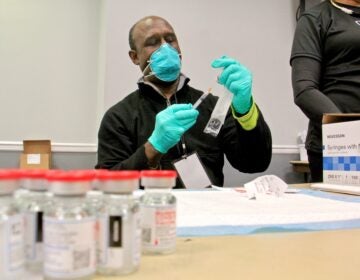
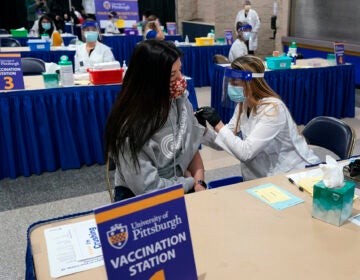
![CoronavirusPandemic_1024x512[1]](https://whyy.org/wp-content/uploads/2020/03/CoronavirusPandemic_1024x5121-300x150.jpg)


